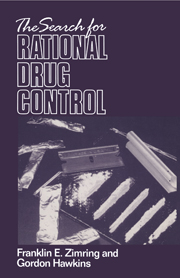Crossref Citations
This Book has been
cited by the following publications. This list is generated based on data provided by Crossref.
Altschuler, David M.
and
Luneburg, William V.
1992.
The Juvenile Justice And Delinquency Prevention Formula Grant Program: Federal-State Relationships In A Quasi-Regulatory Context*.
Criminal Justice Policy Review,
Vol. 6,
Issue. 2,
p.
136.
Pearson, Geoffrey
1993.
Pharmacology and fashion.
European Journal on Criminal Policy and Research,
Vol. 1,
Issue. 2,
p.
9.
Jacobs, Brian D.
1993.
Riots in Britain and the United States: The Bureau‐Politics of Crisis Management and Urban Policy.
Journal of Contingencies and Crisis Management,
Vol. 1,
Issue. 3,
p.
152.
Pearson, Geoffrey
1993.
HARM REDUCTION NOT DEMAND REDUCTION.
Criminal Justice Matters,
Vol. 12,
Issue. 1,
p.
9.
Case, Patricia
and
Walsh, Diana Chapman
1993.
The War On Drugs: Is it Time to Declare a Truce?.
Health Affairs,
Vol. 12,
Issue. 1,
p.
222.
Reuter, Peter
1993.
Prevalence Estimation and Policy Formulation.
Journal of Drug Issues,
Vol. 23,
Issue. 2,
p.
167.
Miller, J. Mitchell
and
Selva, Lance H.
1994.
Drug enforcement's doubleedged sword: An assessment of asset forfeiture programs.
Justice Quarterly,
Vol. 11,
Issue. 2,
p.
313.
Benson, Bruce L.
Rasmussen, David W.
and
Sollars, David L.
1995.
Police bureaucracies, their incentives, and the war on drugs.
Public Choice,
Vol. 83,
Issue. 1-2,
p.
21.
MacCoun, Robert
Reuter, Peter
and
Schelling, Thomas
1996.
Assessing alternative drug control regimes.
Journal of Policy Analysis and Management,
Vol. 15,
Issue. 3,
p.
330.
Karstedt, Susanne
and
Greve, Werner
1996.
Kritische Kriminologie in der Diskussion.
p.
171.
Dellon, Evan S.
Lewis, David C.
and
Gear, Camille A.
1997.
Alternatives to U.S. drug policy.
The Journal of Primary Prevention,
Vol. 17,
Issue. 4,
p.
383.
Hall, Mary F.
1997.
The “war on drugs”: A continuation of the war on the African American family.
Smith College Studies in Social Work,
Vol. 67,
Issue. 3,
p.
609.
LUTZE, FAITH E.
and
MARENIN, OTWIN
1997.
The Effectiveness of a Shock Incarceration Program and a Minimum Security Prison in Changing Attitudes toward Drugs.
Journal of Contemporary Criminal Justice,
Vol. 13,
Issue. 2,
p.
114.
Gaus, Gerald F.
1998.
Why all Welfare States (Including Laissez-Faire Ones) Are Unreasonable.
Social Philosophy and Policy,
Vol. 15,
Issue. 2,
p.
1.
Benson, Bruce L.
and
Rasmussen, David W.
1998.
The Context of Drug Policy: An Economic Interpretation.
Journal of Drug Issues,
Vol. 28,
Issue. 3,
p.
681.
FUENTES, JOSEPH R.
and
KELLY, ROBERT J.
1999.
Drug Supply and Demand.
Journal of Contemporary Criminal Justice,
Vol. 15,
Issue. 4,
p.
328.
Brown, Darryl K.
2000.
Street Crime, Corporate Crime and the Contingency of Criminal Liability.
SSRN Electronic Journal ,
Zalman, Marvin
2000.
Criminal Justice and the Future of Civil Liberties.
Criminal Justice Review,
Vol. 25,
Issue. 2,
p.
181.
Belenko, Steven
2002.
THE CHALLENGES OF CONDUCTING RESEARCH IN DRUG TREATMENT COURT SETTINGS.
Substance Use & Misuse,
Vol. 37,
Issue. 12-13,
p.
1635.
MacMaster, Samuel A.
and
Vail, Kenneth A.
2002.
Demystifying the Injection Drug User: Willingness to Participate in Traditional Drug Treatment Services Among Participants in a Needle Exchange Program.
Journal of Psychoactive Drugs,
Vol. 34,
Issue. 3,
p.
289.



